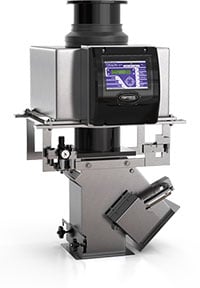 Never has more stress and emphasis been placed on food safety and quality assurance than today, where recalls and consumer dissatisfaction can completely and irreparably ruin brand images. Due to this incredible focus on food and consumer safety, effective inspection technologies and techniques have become paramount to a manufacturer and brand’s success.
Never has more stress and emphasis been placed on food safety and quality assurance than today, where recalls and consumer dissatisfaction can completely and irreparably ruin brand images. Due to this incredible focus on food and consumer safety, effective inspection technologies and techniques have become paramount to a manufacturer and brand’s success.
Safety Inspection and Your Brand
The incredible importance of food safety and quality inspections is largely based on not only the well-being and safety of the public consumer, but also the relationship between food quality and brand recognition. While contemporary inspection technology very effectively attends to the health and safety concerns of the public, proper and successful inspections are also key components in building and improving upon a company’s brand image.
Due to the incredibly accurate inspection applications of modern X-ray technology and metal detectors, companies are able to more consistently deliver on quality guarantees, as these technologies can catch what the human eye and conventional inspection mediums cannot; this eliminates the threat of public relations disasters following flawed or potentially unsafe product distribution.
These technologies also greatly limit the risk of major recalls and widespread consumer dissatisfaction, which can be incredibly damaging for a brand. Almost all of today’s X-ray and metal detection inspection technologies are HACCP (Hazard Analysis and Critical Control Point) compliant, and adhere to Global Food Safety Initiative (GFSI) quality standards. The HACCP’s approach to food safety revolves around seven core principles:
- Effective food safety hazard analysis
- Identification of critical control points (CCPs)
- Establishing critical limits al all CCPs
- Establishing CCP monitoring systems
- Monitoring of CCPs and corrective actions when CCPs are not controlled
- Establishing record-keeping procedures (Complete Traceability)
- Enacting procedures to verify successful system operation
The BRC Global Standard for Food Safety requires that manufacturers and production suppliers take certain safety and quality measures, including:
- Traceability, product management, integrated systems and connectivity solutions
- Quality control, data management and quantity control
- Foreign body detection and removal equipment
- Hygienically-designed equipment, sanitary design and appropriate cleaning processes
By adhering to all BRC, SQF, GFSI are HACCP standards, manufacturers can better assure their product’s quality and safety to consumers, and keep their brand image intact. The most effective inspection options available for manufacturers today vary from X-ray inspection technology to metal detection technology.
X-Ray Inspection
X-ray inspection technology is thought of as one of today’s most accurate and powerful quality inspection applications. With strong enough sensitivity to identify slight imperfection in products, this technology has been implemented in manufacturing and food product lines around the world.
X-ray’s near flawless and highly scrupulous eye for changes in products and detail have made it a preferred technology for many manufacturers. To put x-ray’s incredibly inspection ability into context, today’s powerful machines can scan areas as small as 0.2mm for metal traces. X-ray technology is most often use to detect food product imperfections, such as:
- Foreign body presence, such as metal, stones, glass or bones
- Integrity of boxed products
- Missing products in sealed containers
- Bottle fill-levels
- Insufficient product weight or irregular dimensions
- Air bubbles within products such as meat
- Missing packaging inserts or instructional components
Furthermore, X-ray inspection technology is ideal for difficult applications since it is unaffected by:
- Unaffected by the content or conductivity of the product: high moisture /salt content
- Unaffected by the state of the product: Dry, hot, cold, frozen, semi-frozen, etc.
- Unaffected by the packaging: metalized foil, metal cap, metal packaging (even a metal can), etc.
X-ray technologies are also renowned by manufacturers for their easy to understand operation, simple integration with existing systems and great benefits on time management and financial resources.
Metal Detection
Metal detection technology, much like X-ray technology, is a widely used and highly effective food quality inspection tool. However, metal detection technologies are more ably tailored for dealing with product lines that incorporate metal machinery or other components in the packaging process.
Able to accurately scan both “dry” (non-conductive) and “wet” (conductive) foods, metal detection technology can also adjust for “product effects” (moisture, acidity, mass and temperature) that food products can create when passing through the detector. Metal detectors protect the quality of your products and brand name in limitless applications, such as the inspection of:
- Free-flow dry products, such as corn, beans and rice
- Pulp, paper and other packaging materials
- Glass, plastic bottles and bottling equipment
- Pumped matter, such as meat, liquid, cheese and dairy
Metal detection technology, like X-ray technology, is now a preferred method of safety and quality inspection for many food service manufacturers. Many of today’s metal detectors feature modular electronics, which ease operation, high power transmitters, which increase sensibility, and Ethernet ports, which allow for instantaneous data logging and networking integration.
Additional Benefits
In addition to incredibly accurate safety inspection, quality assurance and the protection of your company’s brand, today’s highly effective inspection technologies can also your company countless manufacturing dollars and labor time. Companies utilizing these methods can spend less resources physically inspecting their products and working to verify their safety, and more on other measures to improve business.
Learn More about the Importance of Food Inspection
To learn more about the great importance of food quality and safety assurance, or what X-ray technologies and metal detectors can do for your food production operation, contact us today.




